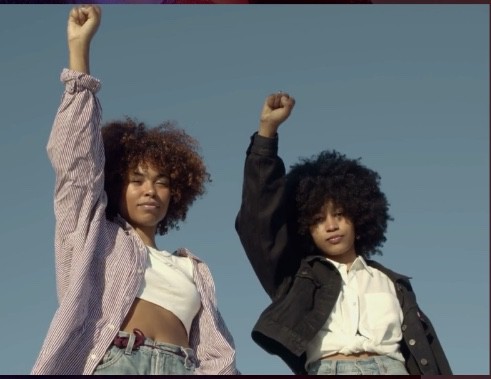Self-advocacy. The act of speaking up and speaking out on behalf of yourself in order to make known your wants and needs and to advance your interests and views.
Sounds really good on paper. Works pretty well, too, when you’re a cis hetero white male.
If you’re a woman, not so much.
If you’re a Black woman… well, um…
Self-advocacy for Black women is “tricky” because we’re subject to the “landmines” of white supremacy and of patriarchy. In other words, there exists different standards and rules for Blacks and different rules and standards for women. We navigate white spaces, white standards, white rules.
Yes. Intersectional oppression is utterly blaxhausting.
Whiteness would have us believe that when we advocate for ourselves we’re troublemakers (or worse). And because whiteness presumes to control all aspects of our lives, it also wants to control the narrative—especially when self-advocacy runs counter to the aims of white dominance.
Whether it’s speaking our truths or calling out injustices, our voice is our power. And every time we lift it, we disrupt the status quo, spark change, and pave the way for others.
Many of us liken self-advocacy to a “fight” because it feels like a battle to get our voices heard and included. Add to that the reality that “if a white man says it or does it,” it is regarded one way; “if a Black woman says it or does it,” it is regarded another way. Our skin color and our voices have been demonized and criminalized.
You know the routine. A white man will be lauded, while a Black woman will be condemned. Think back to the vice-presidential debate between Kamala Harris and Mike Pence. Every single Black woman no doubt watched with bated breath knowing what was at stake—the intense scrutiny to which Harris would be subjected regarding her words, her “tone,” her “attitude, her voice level, her body language, her hand gestures, her facial expression, etc.
And all of this in addition to her actual views being evaluated! Whew chile!
Just as “life ain’t been no crystal stair” for us, self-advocacy for Black women is no easy task. At the same time though, the white supremacist, racist country we inhabit makes self-advocacy necessary. There ain’t a whole lot of folks speaking up for us, so…. what that means is YOU showing up for YOU.
The most important part of self-advocacy is that “self” part. What if I say to you that you can engage in self-mentoring to get better at self-advocacy? In this context, self-mentoring is a process whereby you take stock of your strengths and opportunities as part of a plan to become better at self-advocating. The process involves a lot of “self-ing”—self-awareness, self-reflection, self-assessment, self-affirmation, self-development, self-monitoring.
Because our lives get so overshadowed by what whiteness projects onto us, sometimes we don’t know what we don’t know about ourselves. What self-advocacy traits do you possess but have not activated? What self-advocacy traits do you exhibit in some areas of your life but have avoided exhibiting in others. What self-advocacy traits do you not possess and want to develop?
Grab a journal. Take a look at the following traits and evaluate yourself on each one. Your choice. You can rate each trait on a scale of 1 to 10 based on the extent to which you feel it is a strong trait. Or you can jot down examples of your use of a trait and the circumstances surrounding the use.
- I speak up and speak out when others are silent.
- I don’t care what anybody else thinks of me when I speak up and speak out.
- I take care of and prioritize myself.
- I do the right thing even when it’s unpopular or hard to do.
- I challenge the status-quo.
- I call out racism and bias.
- I live by my own rules.
- I don’t give up easily.
- I undertake brave and courageous conversations and pursuits.
- I speak truth to power.
- I take calculated risks.
- I set and communicate boundaries.
- I am not swayed by trolls and haters.
- I don’t give in to peer pressure.
- I speak my mind.
Sit with your notes and reflect. What did you discover or rediscover about yourself? What are you going to DO now? What’s next? Stay tuned for part II.
*Content adapted from The WarriHER’s Playbook on Well-Being and Self-Advocacy.
*Extended treatment of blaxhaustion can be found in Blaxhaustion, Karens & Other Threats to Black Lives and Well-Being
###
Your support of my work is greatly appreciated. Tangible ways to show your support include the following—
- your purchase of one or more of my four published books
- an Amazon review of one or more of my four published books
- an invitation to speak-for-hire to your team or organization
- a financial donation to support my future projects, which include the development of online courses
Pay Pal
Theresa M Robinson
Venmo
@Theresa-Robinson-1
Cash App
$tmr50
Thank you!
#WomensHistoryMonth #blackwomen #history #antiracism #inclusion #selfadvocacy #wellbeing


Recent Comments